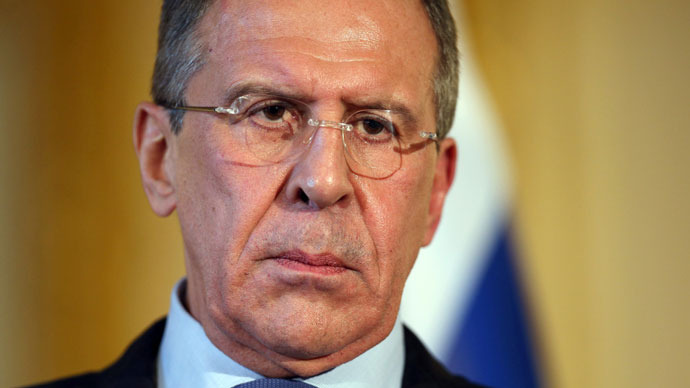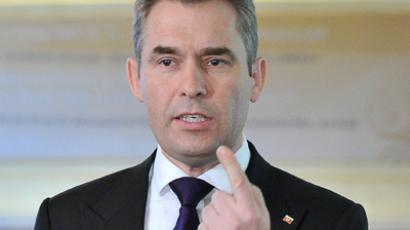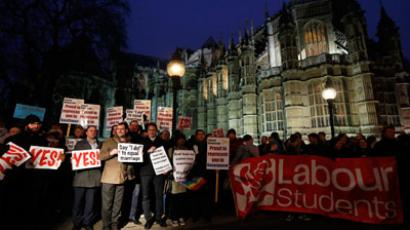Moscow to create database of Russian children with foreign families – Lavrov

Russia is working on a database on all Russian children adopted by foreigners says Foreign Minister Sergey Lavrov. Moscow will push for a US response to its requests into suspected cases of abuse of Russian kids in adoptive American families.
Lavrov addressed MPs on Friday after a string of scandals regarding Russian kids adopted by American families. In one of the most recent developments, three-year-old Maksim Kuzmin died in Texas at the end of January. Although US prosecutors have not laid any charges on Maksim’s adoptive parents due to the lack of evidence, Russia has launched its own investigation.
The minister said that when a Russia kid is adopted by an American family – or any other foreign family – in most cases they lose their Russian names.
“In the end, when media report on any incident, it is impossible to understand if a child comes from Russia or not,” said Lavrov.
In order to tackle this, the ministry is now working on a database to track all Russian children adopted by foreign families, he revealed. Russia is also waiting on Washington to provide full details on Maksim’s death.
“We are not going to put up with the fact that we were denied the documents concerning the circumstances of Maksim Kuzmin`s death, including postmortem examination results,” Lavrov told the State Duma.
Prosecutor General Yury Chaika said that the US has responded positively to only one out of 19 requests regarding alleged crimes against adopted Russian children.
“We have received only seven responses, and only in one case was the request fulfilled,” he said.
He also said that at the recent meeting at the US embassy American authorities vowed to review the requests again and to provide proper responses.
Over the past 20 years around 60,000 Russian children were
adopted by American families - at least 20 of them died in their
new families because of ill treatment or accidents. Officials in
Moscow repeatedly complained that the US Justice System was issuing
disproportionately mild punishment in cases involving the abuse of
Russian adopted children. Adding to their frustrations, Russian
diplomats were prevented from giving sufficient input in the
prosecution of such cases.
In a move to counter a series of tragic incidents involving Russian
orphans, Moscow banned all adoptions by American citizens, starting
January this year. The controversial law split the Russian society
with critics saying that it eliminates hope for a better life for
thousands of children – especially those with health problems – as
now their chances to get a family are close to zero. Besides that,
the leadership was accused of “using children in political games”
as the adoptions ban – known as Dima Yakovlev law – was signed
shortly after the US passed the so-called Magnitsky Act. Officials
claimed though that there was no connection between the two
documents.
Gay Paris under new scrutiny over same-sex marriage
Lavrov also noted that the country’s judicial authorities need to check applicants for adoption more carefully, adding that the possible legalization of same sex marriage in France would prompt Russian officials to toughen the standards for French citizens adopting Russian children.
“In particular, it is necessary to take into account that the prepared legalization of same-sex marriage in France brings a new element to the adoption to this country,” he said.
Thus, when it comes to adoptions by French citizens, vigilance needs to be increased so that Russian children are adopted by families corresponding to the idea of family implied in Russian law, he explained.
Russia and France have a very strict agreement on French adoptions in Russia. According to the document, Moscow has the right to exercise control over the lives of Russian children adopted in France.
Adoptive French parents must register the child at the local Russian consulate and have to regularly provide Russian authorities with the information regarding the child’s wellbeing and living conditions.
France and Italy, are the two countries with whom Moscow has
bilateral agreements on child adoption. A similar agreement
was also signed with the USA, but – following the signing of the
Dima Yakovlev law - it will be axed in January 2014.
Earlier in January, Russian lawmakers suggested to ban all foreign
adoptions, except by nationals of the countries with which Russia
has adoption treaties. The idea seems logical for a large
part of Russian society, who believe that Russian orphans would be
happier in their homeland. The country’s Children’s Rights
Ombudsman Pavel Astakhov also very much welcomes the initiative. In
his view, it is a “disgrace for a country when its children are
taken abroad and paid money to boot.”














